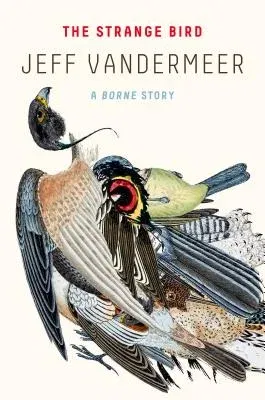The Strange Bird--from New York Times bestselling novelist Jeff
VanderMeer--expands and weaves deeply into the world of his "thorough
marvel"* of a novel, Borne.
The Strange Bird is a new kind of creature, built in a laboratory--she
is part bird, part human, part many other things. But now the lab in
which she was created is under siege and the scientists have turned on
their animal creations. Flying through tunnels, dodging bullets, and
changing her colors and patterning to avoid capture, the Strange Bird
manages to escape.
But she cannot just soar in peace above the earth. The sky itself is
full of wildlife that rejects her as one of their own, and also full of
technology--satellites and drones and other detritus of the human
civilization below that has all but destroyed itself. And the farther
she flies, the deeper she finds herself in the orbit of the Company, a
collapsed biotech firm that has populated the world with experiments
both failed and successful that have outlived the corporation itself: a
pack of networked foxes, a giant predatory bear. But of the many
creatures she encounters with whom she bears some kind of kinship, it is
the humans--all of them now simply scrambling to survive--who are the
most insidious, who still see her as simply something to possess, to
capture, to trade, to exploit. Never to understand, never to welcome
home.
With The Strange Bird, Jeff VanderMeer has done more than add another
layer, a new chapter, to his celebrated novel Borne. He has created a
whole new perspective on the world inhabited by Rachel and Wick, the
Magician, Mord, and Borne--a view from above, of course, but also a view
from deep inside the mind of a new kind of creature who will fight and
suffer and live for the tenuous future of this world.
Praise for Borne
*"Jeff VanderMeer's Southern Reach Trilogy was an ever-creeping map
of the apocalypse; with Borne he continues his investigation into the
malevolent grace of the world, and it's a thorough marvel." --Colson
Whitehead
"VanderMeer is that rare novelist who turns to nonhumans not to make
them approximate us as much as possible but to make such approximation
impossible. All of this is magnified a hundredfold in Borne . . . Here
is the story about biotech that VanderMeer wants to tell, a vision of
the nonhuman not as one fixed thing, one fixed destiny, but as either
peaceful or catastrophic, by our side or out on a rampage as our
behavior dictates--for these are our children, born of us and now to be
borne in whatever shape or mess we have created. This coming-of-age
story signals that eco-fiction has come of age as well: wilder, more
reckless and more breathtaking than previously thought, a wager and a
promise that what emerges from the twenty-first century will be as good
as any from the twentieth, or the nineteenth." --Wai Chee Dimock, The
New York Times Book Review

